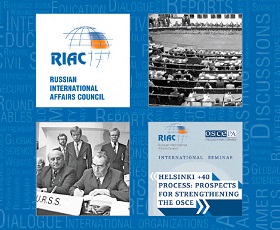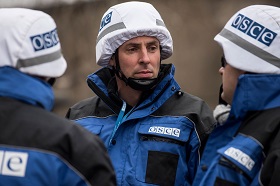The OSCE has become an important tool in the maintenance of a constructive relationship between participating states. This point appears to have returned today, when during the Ukrainian crisis, the OSCE has proved to be the only institution of European security that could engage all parties of the conflict in dialogue to seek the crisis’ resolution. This again has helped to reiterate the OSCE’s competitive advantages as being universality, equality and flexibility, all developed over its history.
Among the multitude of international organizations existing today, the Organization for Security and Cooperation in Europe (OSCE) is a unique case. It brings together 57 states across three continents in an effort to build peace and prosperity based on a comprehensive understanding of security.
For the past 40 years, despite all the crises and disagreements the OSCE has faced, it has been able to overcome them successfully, as its member states time and again have realized the importance and necessity of its existence. Quite often, the OSCE has become an important tool in the maintenance of a constructive relationship between participating states. This point appears to have returned today, when during the Ukrainian crisis, the OSCE has proved to be the only institution of European security that could engage all parties of the conflict in dialogue to seek the crisis’ resolution [1]. This again has helped to reiterate the OSCE’s competitive advantages as being universality, equality and flexibility, all developed over its history.
The OSCE’s path of development is also unique. It essentially grew out of a multilateral conference, which was a very long-lasting process, resulting in the establishment of the Conference on Security and Cooperation in Europe (CSCE), replaced in 1995 by the Organization (OSCE). During the Cold War, when Europe was split by the bloc confrontation and relations were extremely tense, the CSCE became one of the main platforms where it was possible not only to bring all stakeholders in Europe to the negotiating table, but also to achieve détente and compromise on many key issues. It thus became the basis for interstate relations for decades to come. From its beginning, the OSCE was ahead of its time.
Today, looking back, it may seem that the success of the meeting in Helsinki in 1975 was the result of a convergence between the member states and mutual concessions. However, the creation of the CSCE was rather the result of a hard compromise between the two systems. During tough negotiations, a balance between the two blocs and a unique comprehensive understanding of security were achieved. While the USSR was primarily interested in the military and political spheres, the West insisted on adherence to common humanitarian norms. Relations in the economic and ecological fields were not so conflictual and were included to balance the two dimensions on which opinions diverged significantly. When the Helsinki Accords were signed, the CSCE’s three “baskets,” or main spheres, were agreed upon: politico-military, economic-ecological and humanitarian dimensions [2]. This comprehensive understanding went far beyond traditional notions of international security. Thus already at the time of its establishment, the OSCE was able to step into the future. It was its first breakthrough achievement.
The achievement of a balance between the two systems and the desire to maintain it was one of the main reasons that the CSCE survived the difficult period of the late 1970s through the first half of 1980s. Unprecedented steps to defuse relations and confidence-building measures made by CSCE participating states in the late 1980s opened up possibilities for developing relations in a new non-confrontational manner. The signing of the CSCE Charter of Paris of 1990 marked a new epoch, where participating states reaffirmed their “steadfast commitment to democracy based on human rights and fundamental freedoms, prosperity through economic liberty and social justice, and equal security for all our countries,” noting that it was now time to implement these hopes and expectations [3].
The implementation of this project to create a single security community based on shared values initiated the process of institutionalization in the CSCE. Within a short period, a number of new and innovative organizational structures were established and became operational.
The next CSCE 1992 summit in Helsinki declared in its final document the CSCE as the forum, “for dialogue, negotiation and co-operation, providing direction and giving impulse to the shaping of the new Europe” [4]. Mechanisms of new negotiations on arms control, confidence-building measures and harmonization of the obligations in the field of security and the development of new instruments to prevent conflicts were launched.
As a result, in just a few years the organization had at its disposal a powerful tool for building a fundamentally new level of cooperation in the field of security. A significant reduction in the number of armed forces in Europe under international control was started, a series of field missions to resolve conflicts was launched, and common rules for elections and respect for human rights throughout the OSCE area were developed. Finally, the very Conference was renamed to the Organization.
Thus, it was the second breakthrough achievement of the OSCE and its members were again able to realize a better future. Of course, while the implementation of these new common projects revealed many challenges, this allowed the organization to learn from its mistakes and move forward.
The OSCE entered the 21st century with a new capacity for further development of cooperation in the field of security. However, a new disorder in relations between the participating states began, which inevitably affected the very state of the organization. Several countries do not fulfill their earlier commitments, there was criticism of the OSCE for becoming politicized and imbalanced in its activities (biased along the humanitarian dimension), and other international institutions began to adopt its functions. This led to limited OSCE activity in some regions and the marginalization of its role in European security system. The Organization was threatened by the division of Europe into two security systems – Euro-Atlantic and Eurasian – as was reflected in the 2010 Astana Summit communiqué [5].
OSCE was plunged into crisis and began to lose its position, becoming “a far less visible landmark on the European institutional landscape than was formerly the case” [6]. Nevertheless, a new deterioration in relations between the OSCE participating states, which reached its peak in 2014 with the conflict in Ukraine, has reinvigorated the OSCE and allowed it to take on a constructive role.
A unique cooperative nature, including its strengths in the field of conflict management – inclusivity, expertise and rapid reaction [7] – helped the organization deploy a monitoring mission in Ukraine in a short time, which remains the only presence of an international organization for security in the conflict region.
Today what are the prospects of the OSCE in this situation? The paradox is that the OSCE potential is huge – there are many powerful mechanisms and structures working already, which can greatly improve the security situation soon. However, due to a lack of political will, many mechanisms do not work in full and the OSCE's potential remains unfulfilled.
To strengthen the OSCE, participating states should adopt a constitutional document providing the OSCE with legal personality, especially as many steps have already been agreed in advance. In addition, across a wide range of areas of activity, it is necessary to elaborate the organization's priorities and to reach an agreement on their development, without duplicating the functions of other institutions as far as possible. We need to agree on how, in practice, the OSCE should work with new challenges and threats to security. Furthermore, the OSCE conflict resolution capacity should be strengthened, including giving the OSCE the right to establish missions without unanimity among participating states [8].
Harmonizing further principles of future relations based on a comprehensive understanding of security – these were two great OSCE achievements, in the 1970s and the 1990sand were significantly ahead of their time, allowing the organization to set the tone in the security sphere for the decades following. Whether the organization can once again become such an institution for our generation by resolving all current contradictions depends on the will of participating states now. Ultimately, any international organization is a reflection of common beliefs of its members. The OSCE is no exception. Like a sensitive barometer, it reflects the state of relations in the sphere of European security.
1. Strengthening the OSCE. Building a Common Space for Economic and Humanitarian Cooperation, an Indivisible Security Community from the Atlantic to the Pacific / [A.V. Zagorski]; [I.S. Ivanov, Editor-in-Chief]; RIAC. Moscow, 2014. P. 4.
2. Pal Dunay. The OSCE in crisis. Chailot Paper № 88. Paris: EU Institute for Security Studies, 2006. Pp. 19-20 // http://www.iss.europa.eu/uploads/media/cp088.pdf.
3. Charter of Paris for a New Europe. Paris, 1990. P. 3 // http://www.osce.org/mc/39516?download=true.
4. CSCE Helsinki Document 1992. The Challenges of Change. Helsinki, 1992. Point 22 // http://www.osce.org/mc/39530?download=true.
5. Astana Commemorative Declaration towards a Security Community. Astana, 2010. P. 1 // https://www.osce.org/cio/74985?download=true.
6. Pal Dunay. OSCE in crisis. P. 7.
7. Wolfgang Zellner and Frank Evers (principle authors) et al. The Future of the OSCE Field Operations. Vienna, 2014. Pp. 16-17 // http://www.sfpa.sk/dokumenty/publikacie/392.
8. Strengthening the OSCE. Pp. 6-8, 21-25.







